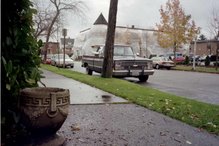Saturday, November 30, 2013
Pretty Pond, But Overgrown in the 1990s
Friday, November 29, 2013
Thanksgiving Bird Count 2013
 |
| Pond During Restoration 2007 |
Monday, November 18, 2013
SHIP FROM BOSTON TO LIVERPOOL
Now I want to go back to when we took our trip across from Boston to Liverpool.. I'm going to tell you how we lived on that ship. In the first place I want to correct what might have been an error. When I was up there, as I said, dumping over the trash can - we didn't throw over the can we just emptied the can over board. This was done at close to dark, because it was done at night so that any submarine that might have been around would not see that trash and radio ahead to some more submarines to let them know that we were coming. Now as I said a lot of the men on that ship were tense as long as we were on it. It took us nine days to go across over the ocean, there the sleeping quarters were very cramped as anyone who has ever served or traveled on a troop transport will know. Our ceiling was about nine feet from the floor and in there were three bunks high and the bunks were so close together that a man could just barely stand between and in our bunk we slept with all our clothes on even our shoes.
END OF SIDE
TAPE LABELED - FROM 1923 to 1941 ELMENDORF FIELD ALASKA
As I was saying, we slept with all our clothes on, even our shoes when we were on the transport. If we wanted to change our socks we had to take off one shoe and take off that sock then put on a clean sock and put a shoe back on and then do the other foot.
We were not to do both feet at a time we also had to be able to sleep with our mae west in the bunk with us, one arm in it at all times, we had also in our bunk, our duffle bag, and our back pack, our helmet and gas mask was hung on the end of the bunk and so we were fairly crowded.
The ship had been once a passenger ship on the Seattle to San Francisco run. It was the H.F. Alexander, it carried about 200 or 250 passengers on that run. However, when the ship was transferred into a troop transport it was supposed to carry about 2000.
However, before we left Boston 500 additional soldiers came on board. They were engineers who were supposed to be on a ship which had developed engine trouble. And therefore they had to divide up its passengers among several other ships. And as I say, We got 500 of them. They slept in hammocks in the mess hall at night until about 4 o'clock in the morning, when they had to get out of there in order for the mess attendant to get ready to have breakfast. The men, these engineers, had to go and sleep up on deck.
They did not have any blankets with them, they just slept with their overcoats on. So we were all very happy when one day the captain announced that, barring enemy action, we should arrive in the harbor of Liverpool in about forty-eight hours.




